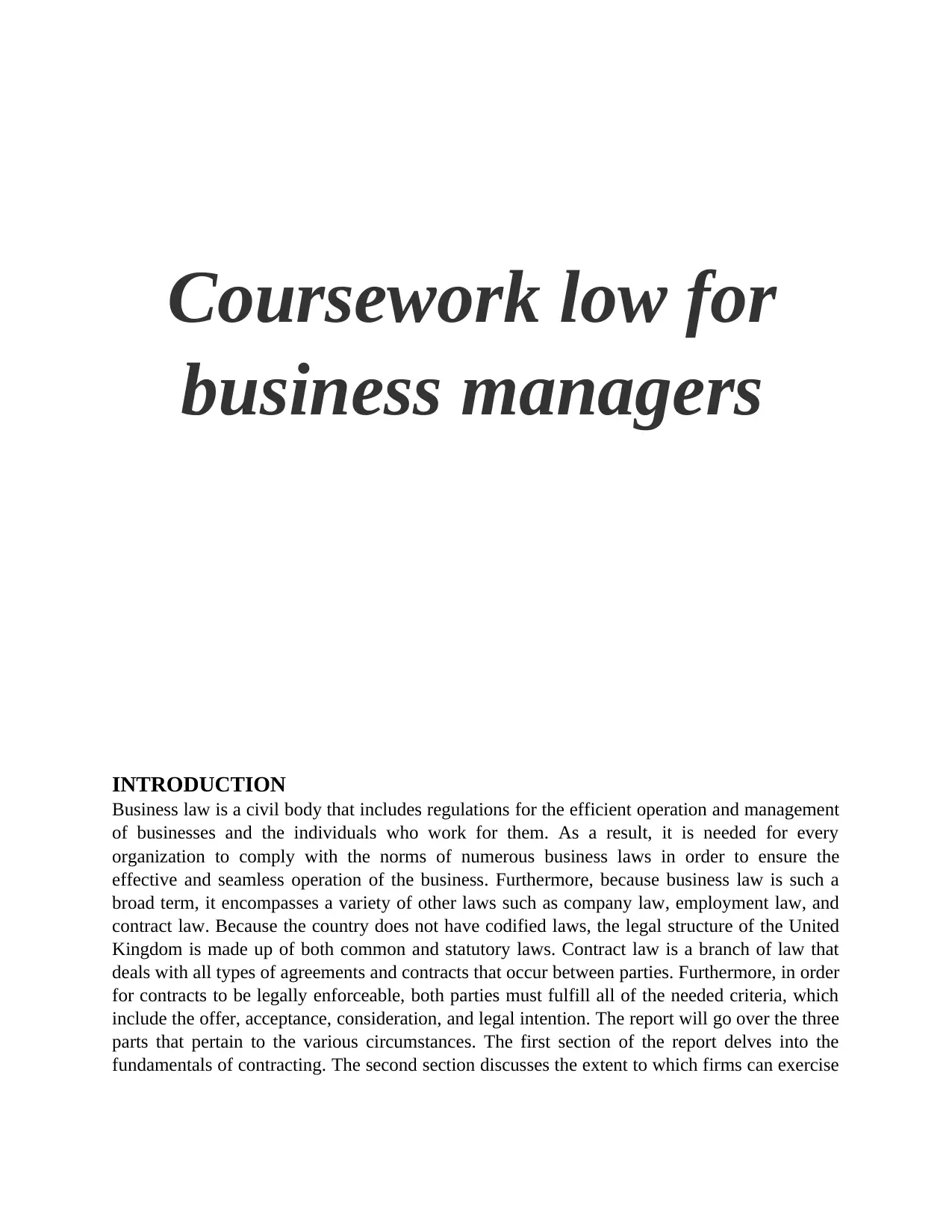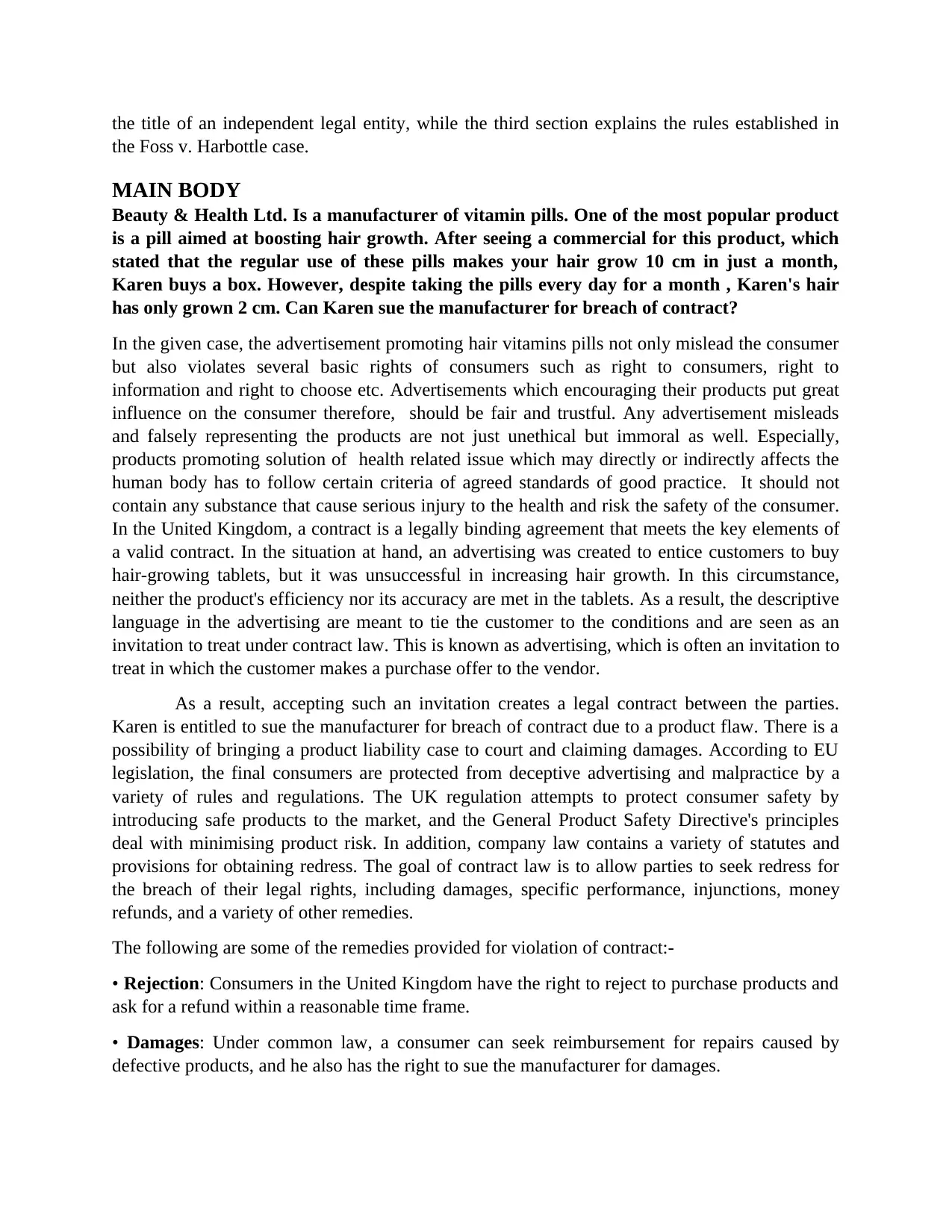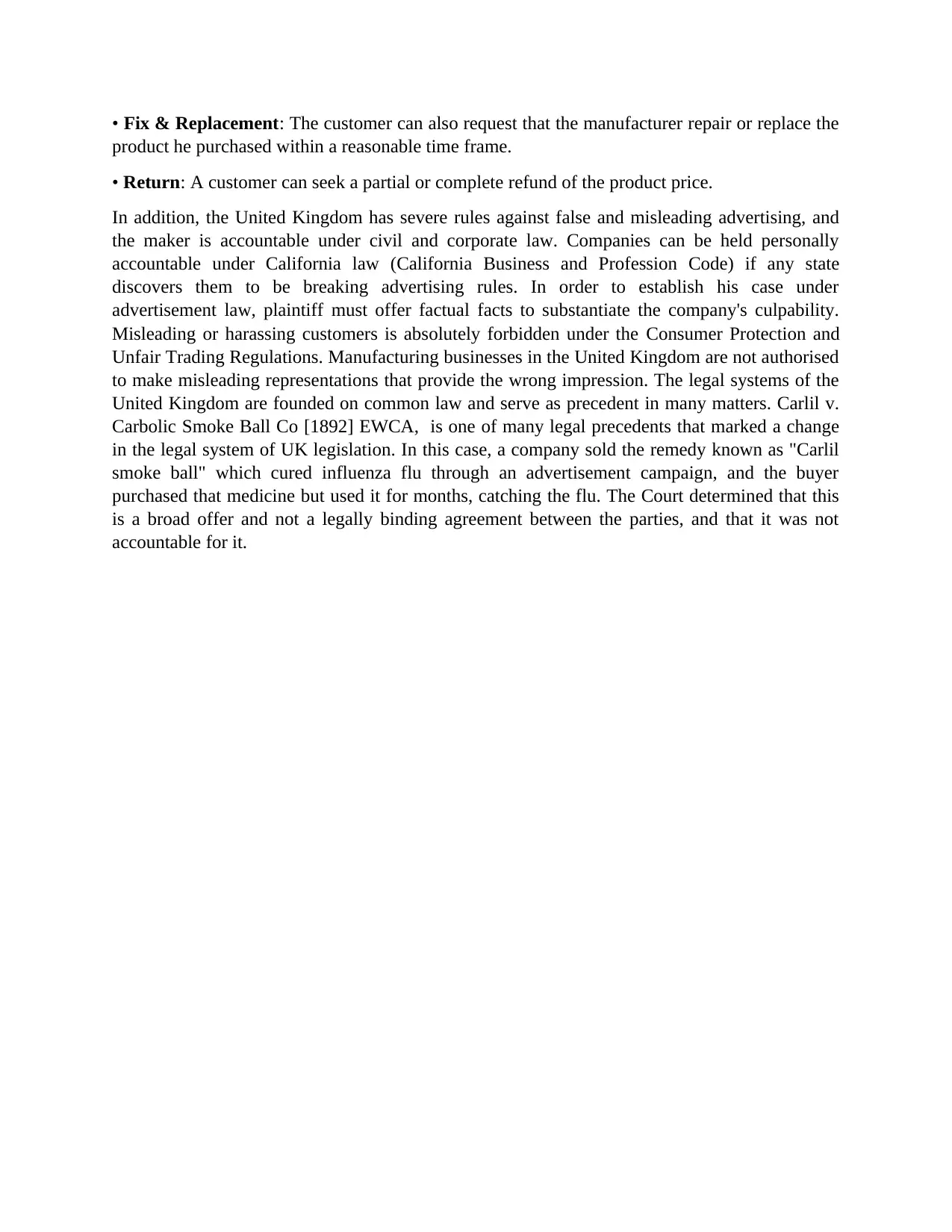Beauty & Health Ltd.: Analyzing a Breach of Contract Case Study
VerifiedAdded on 2023/06/10
|3
|1076
|305
Case Study
AI Summary
This case study examines a potential breach of contract involving Beauty & Health Ltd., a vitamin pill manufacturer, and a consumer, Karen, who experienced minimal hair growth despite the company's advertisement promising significant results. The analysis considers the elements of a valid contract under UK law, focusing on whether the advertisement constitutes an 'invitation to treat' or a legally binding offer. It explores potential remedies available to Karen under consumer protection laws, including rejection, damages, repair or replacement, and refunds. The case study also references relevant legal precedents, such as Carlil v. Carbolic Smoke Ball Co., to illustrate the principles of contract law and advertising standards in the UK. The document highlights the importance of truthful advertising and the legal recourse available to consumers when products fail to meet advertised claims, emphasizing that Desklib provides resources like past papers and solved assignments for students.

Coursework low for
business managers
INTRODUCTION
Business law is a civil body that includes regulations for the efficient operation and management
of businesses and the individuals who work for them. As a result, it is needed for every
organization to comply with the norms of numerous business laws in order to ensure the
effective and seamless operation of the business. Furthermore, because business law is such a
broad term, it encompasses a variety of other laws such as company law, employment law, and
contract law. Because the country does not have codified laws, the legal structure of the United
Kingdom is made up of both common and statutory laws. Contract law is a branch of law that
deals with all types of agreements and contracts that occur between parties. Furthermore, in order
for contracts to be legally enforceable, both parties must fulfill all of the needed criteria, which
include the offer, acceptance, consideration, and legal intention. The report will go over the three
parts that pertain to the various circumstances. The first section of the report delves into the
fundamentals of contracting. The second section discusses the extent to which firms can exercise
business managers
INTRODUCTION
Business law is a civil body that includes regulations for the efficient operation and management
of businesses and the individuals who work for them. As a result, it is needed for every
organization to comply with the norms of numerous business laws in order to ensure the
effective and seamless operation of the business. Furthermore, because business law is such a
broad term, it encompasses a variety of other laws such as company law, employment law, and
contract law. Because the country does not have codified laws, the legal structure of the United
Kingdom is made up of both common and statutory laws. Contract law is a branch of law that
deals with all types of agreements and contracts that occur between parties. Furthermore, in order
for contracts to be legally enforceable, both parties must fulfill all of the needed criteria, which
include the offer, acceptance, consideration, and legal intention. The report will go over the three
parts that pertain to the various circumstances. The first section of the report delves into the
fundamentals of contracting. The second section discusses the extent to which firms can exercise
Paraphrase This Document
Need a fresh take? Get an instant paraphrase of this document with our AI Paraphraser

the title of an independent legal entity, while the third section explains the rules established in
the Foss v. Harbottle case.
MAIN BODY
Beauty & Health Ltd. Is a manufacturer of vitamin pills. One of the most popular product
is a pill aimed at boosting hair growth. After seeing a commercial for this product, which
stated that the regular use of these pills makes your hair grow 10 cm in just a month,
Karen buys a box. However, despite taking the pills every day for a month , Karen's hair
has only grown 2 cm. Can Karen sue the manufacturer for breach of contract?
In the given case, the advertisement promoting hair vitamins pills not only mislead the consumer
but also violates several basic rights of consumers such as right to consumers, right to
information and right to choose etc. Advertisements which encouraging their products put great
influence on the consumer therefore, should be fair and trustful. Any advertisement misleads
and falsely representing the products are not just unethical but immoral as well. Especially,
products promoting solution of health related issue which may directly or indirectly affects the
human body has to follow certain criteria of agreed standards of good practice. It should not
contain any substance that cause serious injury to the health and risk the safety of the consumer.
In the United Kingdom, a contract is a legally binding agreement that meets the key elements of
a valid contract. In the situation at hand, an advertising was created to entice customers to buy
hair-growing tablets, but it was unsuccessful in increasing hair growth. In this circumstance,
neither the product's efficiency nor its accuracy are met in the tablets. As a result, the descriptive
language in the advertising are meant to tie the customer to the conditions and are seen as an
invitation to treat under contract law. This is known as advertising, which is often an invitation to
treat in which the customer makes a purchase offer to the vendor.
As a result, accepting such an invitation creates a legal contract between the parties.
Karen is entitled to sue the manufacturer for breach of contract due to a product flaw. There is a
possibility of bringing a product liability case to court and claiming damages. According to EU
legislation, the final consumers are protected from deceptive advertising and malpractice by a
variety of rules and regulations. The UK regulation attempts to protect consumer safety by
introducing safe products to the market, and the General Product Safety Directive's principles
deal with minimising product risk. In addition, company law contains a variety of statutes and
provisions for obtaining redress. The goal of contract law is to allow parties to seek redress for
the breach of their legal rights, including damages, specific performance, injunctions, money
refunds, and a variety of other remedies.
The following are some of the remedies provided for violation of contract:-
• Rejection: Consumers in the United Kingdom have the right to reject to purchase products and
ask for a refund within a reasonable time frame.
• Damages: Under common law, a consumer can seek reimbursement for repairs caused by
defective products, and he also has the right to sue the manufacturer for damages.
the Foss v. Harbottle case.
MAIN BODY
Beauty & Health Ltd. Is a manufacturer of vitamin pills. One of the most popular product
is a pill aimed at boosting hair growth. After seeing a commercial for this product, which
stated that the regular use of these pills makes your hair grow 10 cm in just a month,
Karen buys a box. However, despite taking the pills every day for a month , Karen's hair
has only grown 2 cm. Can Karen sue the manufacturer for breach of contract?
In the given case, the advertisement promoting hair vitamins pills not only mislead the consumer
but also violates several basic rights of consumers such as right to consumers, right to
information and right to choose etc. Advertisements which encouraging their products put great
influence on the consumer therefore, should be fair and trustful. Any advertisement misleads
and falsely representing the products are not just unethical but immoral as well. Especially,
products promoting solution of health related issue which may directly or indirectly affects the
human body has to follow certain criteria of agreed standards of good practice. It should not
contain any substance that cause serious injury to the health and risk the safety of the consumer.
In the United Kingdom, a contract is a legally binding agreement that meets the key elements of
a valid contract. In the situation at hand, an advertising was created to entice customers to buy
hair-growing tablets, but it was unsuccessful in increasing hair growth. In this circumstance,
neither the product's efficiency nor its accuracy are met in the tablets. As a result, the descriptive
language in the advertising are meant to tie the customer to the conditions and are seen as an
invitation to treat under contract law. This is known as advertising, which is often an invitation to
treat in which the customer makes a purchase offer to the vendor.
As a result, accepting such an invitation creates a legal contract between the parties.
Karen is entitled to sue the manufacturer for breach of contract due to a product flaw. There is a
possibility of bringing a product liability case to court and claiming damages. According to EU
legislation, the final consumers are protected from deceptive advertising and malpractice by a
variety of rules and regulations. The UK regulation attempts to protect consumer safety by
introducing safe products to the market, and the General Product Safety Directive's principles
deal with minimising product risk. In addition, company law contains a variety of statutes and
provisions for obtaining redress. The goal of contract law is to allow parties to seek redress for
the breach of their legal rights, including damages, specific performance, injunctions, money
refunds, and a variety of other remedies.
The following are some of the remedies provided for violation of contract:-
• Rejection: Consumers in the United Kingdom have the right to reject to purchase products and
ask for a refund within a reasonable time frame.
• Damages: Under common law, a consumer can seek reimbursement for repairs caused by
defective products, and he also has the right to sue the manufacturer for damages.

• Fix & Replacement: The customer can also request that the manufacturer repair or replace the
product he purchased within a reasonable time frame.
• Return: A customer can seek a partial or complete refund of the product price.
In addition, the United Kingdom has severe rules against false and misleading advertising, and
the maker is accountable under civil and corporate law. Companies can be held personally
accountable under California law (California Business and Profession Code) if any state
discovers them to be breaking advertising rules. In order to establish his case under
advertisement law, plaintiff must offer factual facts to substantiate the company's culpability.
Misleading or harassing customers is absolutely forbidden under the Consumer Protection and
Unfair Trading Regulations. Manufacturing businesses in the United Kingdom are not authorised
to make misleading representations that provide the wrong impression. The legal systems of the
United Kingdom are founded on common law and serve as precedent in many matters. Carlil v.
Carbolic Smoke Ball Co [1892] EWCA, is one of many legal precedents that marked a change
in the legal system of UK legislation. In this case, a company sold the remedy known as "Carlil
smoke ball" which cured influenza flu through an advertisement campaign, and the buyer
purchased that medicine but used it for months, catching the flu. The Court determined that this
is a broad offer and not a legally binding agreement between the parties, and that it was not
accountable for it.
product he purchased within a reasonable time frame.
• Return: A customer can seek a partial or complete refund of the product price.
In addition, the United Kingdom has severe rules against false and misleading advertising, and
the maker is accountable under civil and corporate law. Companies can be held personally
accountable under California law (California Business and Profession Code) if any state
discovers them to be breaking advertising rules. In order to establish his case under
advertisement law, plaintiff must offer factual facts to substantiate the company's culpability.
Misleading or harassing customers is absolutely forbidden under the Consumer Protection and
Unfair Trading Regulations. Manufacturing businesses in the United Kingdom are not authorised
to make misleading representations that provide the wrong impression. The legal systems of the
United Kingdom are founded on common law and serve as precedent in many matters. Carlil v.
Carbolic Smoke Ball Co [1892] EWCA, is one of many legal precedents that marked a change
in the legal system of UK legislation. In this case, a company sold the remedy known as "Carlil
smoke ball" which cured influenza flu through an advertisement campaign, and the buyer
purchased that medicine but used it for months, catching the flu. The Court determined that this
is a broad offer and not a legally binding agreement between the parties, and that it was not
accountable for it.
⊘ This is a preview!⊘
Do you want full access?
Subscribe today to unlock all pages.

Trusted by 1+ million students worldwide
1 out of 3
Related Documents
Your All-in-One AI-Powered Toolkit for Academic Success.
+13062052269
info@desklib.com
Available 24*7 on WhatsApp / Email
![[object Object]](/_next/static/media/star-bottom.7253800d.svg)
Unlock your academic potential
Copyright © 2020–2025 A2Z Services. All Rights Reserved. Developed and managed by ZUCOL.



